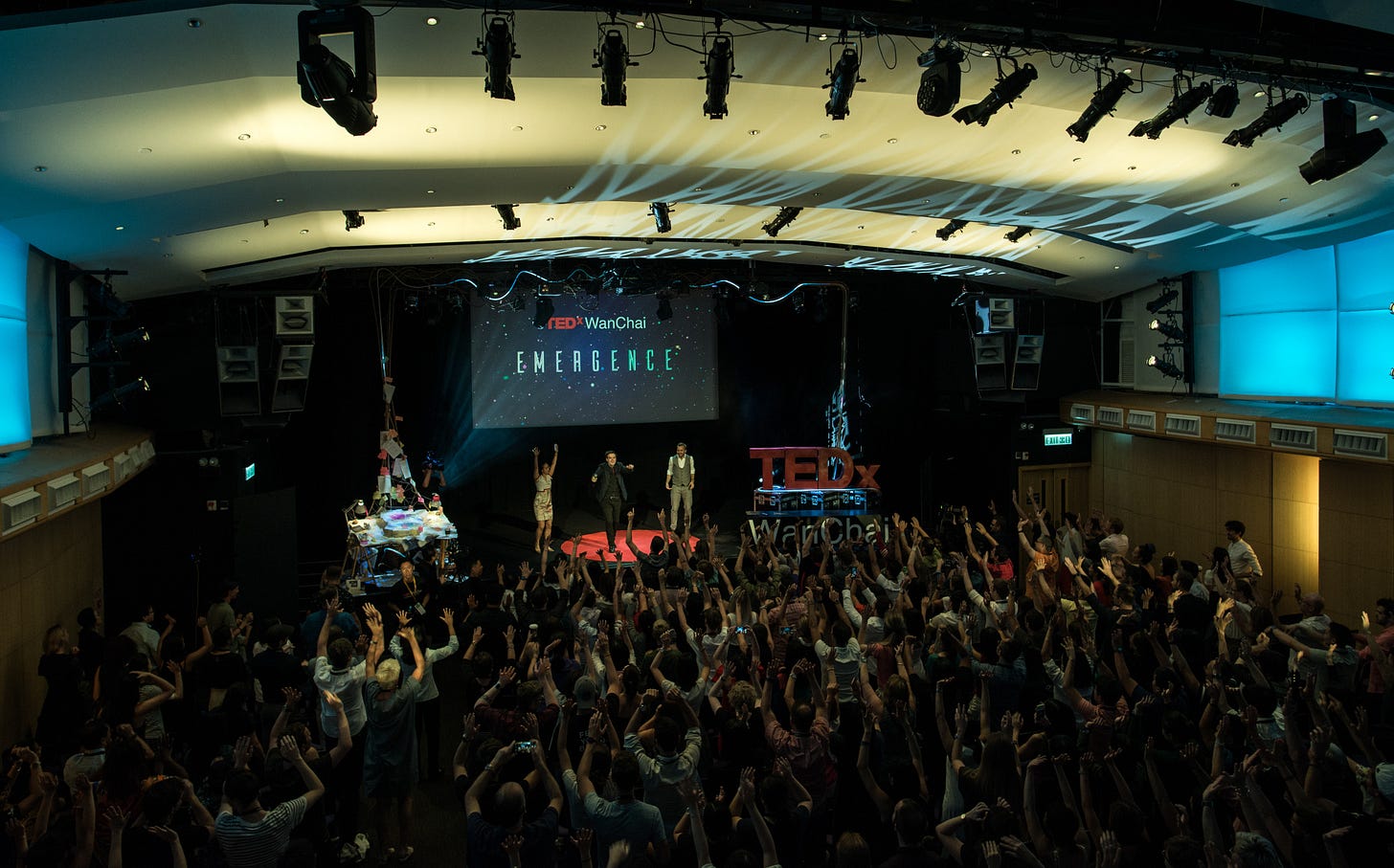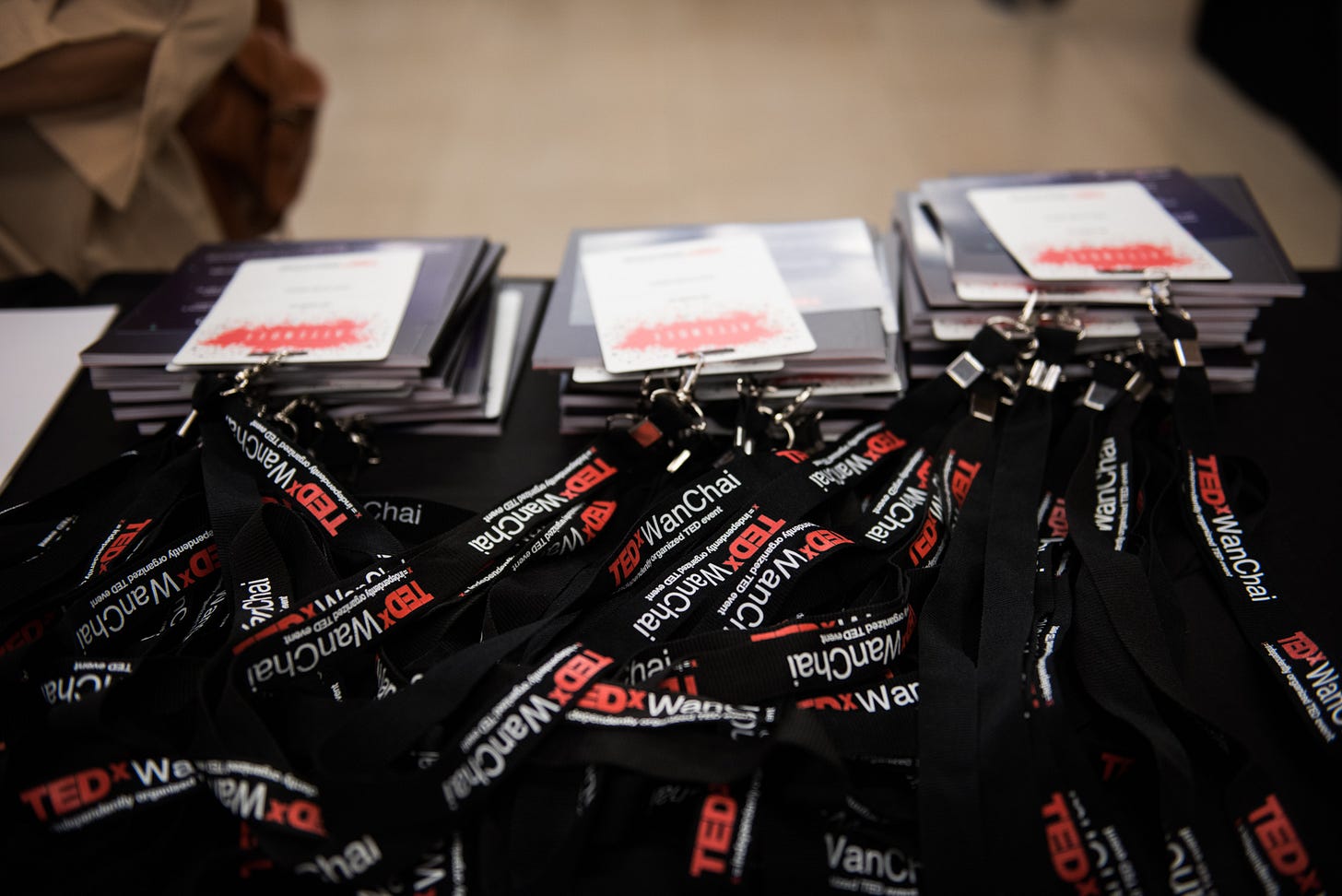The ones that were typical
It seems that every other day, there’s a new conference in town.
The topics differ, but not enough for them to stand out. The invites that land in my inbox are usually a variation of “future of finance”, “investment landscape 2024”, and “finance redefined”.
Thankfully I haven't been to one since I left journalism, but I used to loathe going. A panel of important people is still a well-organized discussion around a specific topic, and that makes easy fodder for a business news article. The speaker circuit is usually the same people, and four of them (usually men) would sit in a line across the stage. The topic would be broad, like “futureproofing the banking industry”, and the speakers would take turns saying some variation of what they’ve already articulated in their own thought leadership websites, in interviews with media, in podcasts, and heck, their personal LinkedIn feeds.
These panels could have been an email.
Still, I remember transcribing some quippy quotes in real-time to slot them into my articles. I’d then sit in the same spot and use the next panel as white noise while I string together one quote per speaker plus some generic macroeconomic knowledge into a short article. I ship off a boring article and listen to another boring panel until it ends so I can leave.
Nothing groundbreaking happens. The audience, mostly sent there by their companies because they either have a booth or need to network, knows that too. Take a glance at any photos of conferences and most attendees are glued to their phones, answering urgent emails from clients or texting their spouses, completely ignoring the show that is on the main stage.
So why do we still do conferences? And more importantly, why are they so boring?
The organizers put the event together for their own clout, whether it’s to say they’re responsible for gathering all the key industry “thought leaders” in one room or to gain that network themselves. Or they’re using conferences as a marketing tool to showcase their products and services with the benefit of on-stage client testimony. The sponsors are there because all their competitors are. The speakers get gloating rights on social media even if it’s just to say the same talking points just repackaged differently. The audience is just there because their employers need to be represented.
What they all have in common: all parties simply don’t care if the conference is bad. Nobody holds anybody accountable.
I say this as someone who’s organized many conferences since 2018. I’ve helped put together media conferences, literary festivals, finance-themed events. I’ve done both in-person and the COVID-induced virtual ones. Putting together a conference is always a huge undertaking. It takes a lot of spreadsheets and logistics to make it work.
My longest streak of conference-organizing was for a journalism conference, five years in a row. The first one seemed great because all the topics were new to me as a fresh reporter: mobile journalism, search engine optimization, online safety. But five iterations later, the agenda was still bloated by these topics. I stuck with it because being part of the organizing team was a good excuse to reconnect with the best journalists that flew in from Japan, Singapore, Korea. But when the pandemic shifted the conference to laptop screens, we failed to replicate the networking energy virtually. Zoom happy hours really don’t work. I tapped out.
Still, for all the bad conferences I attended, there was one that I remembered to be magical.
The one that was different
The energy in that TEDxWanChai room was electric. I don’t recall any one person being on their phone. Each of the 600 audience members wore a name tag that had topics they were interested in to encourage interaction. The talks were extremely tight, at 8 minutes on average. There was also a break every four talks for poetry workshops, coffee, or free-flow conversation. The speakers were in the audience too, and we could just have a conversation with them. It’s very different from business conferences where they’d sequester speakers to a separate backstage area.
The TEDxWanChai team approached this event from a curational perspective. We began planning the conference around a theme and hosted open mics for speakers to audition. We selected speakers not based on their delivery - we’d work on that later - but based on their ideas. We then selected ideas that would represent our theme in its fullest range. We used up a lot of Post It notes.
Then began eight months of more work: we trained the speakers and parsed each sentence, making sure each talk is imperative, interactive, and interesting at every turn. We obsessed over their slides. More pictures, less text. We hosted dress rehearsals. By the time the speakers made it onto the stage, their ideas were in their most concise, novel, and engaging shape. Every audience member left the theater feeling energized and inspired.
So why can’t other conferences be like TED? Sure, it takes a huge amount of resources, investment, and curation. But that conference was actually interesting and well worth attending. Whatever was in that TEDxWanChai theater could not be translated into a livestream. Unfortunately, many organizations think of conferences as just another business task. Something to host regularly without much thought.
And it shows.
The one that I will build?
A work contact approached me the other day about creating a conference. James pitched it as a chance to bring the financial industry together to talk about LGBTQ+ issues. I already happen to be co-chairing Interbank, a peer organization of pride networks across financial services firms in Hong Kong, so I can make it happen if I wanted to. There’s no existing conference in the city that focuses on just LGBTQ+ topics. We have this opportunity! He was so eager. And I was so tempted to say yes. The allure of opening the event on a podium, taking full credit for bringing the biggest forward-thinking financial professionals in Hong Kong together. The chance to prove to the city that LGBTQ+ people exist, and to use this conference as a megaphone. The clout that it will get me and the cause.
Following the usual conference playbook, I immediately thought of the cliché panel topics we could put together. Queer talent in the workplace. Representation in leadership. Employee policies for equality. And because of the weight diversity has in banks these days, I know many would agree to sponsor.
But then I’m reminded of TEDxWanChai. On how special that conference was and the amount of work it took to make that happen. I haven’t given James a definitive response yet. I told him I’d think about it. A good - nay, great conference would need some legit fairy dust. And this conference, if it happens, will not be anything less than magical.
Thank you to friends who make sure my essays are not boring: ,, , and .
Looking back: Gladiators in Rome, before they go to their last fight, would do graffiti with funny stories. They would etch imagery and statements on the walls. Humor is our ultimate freedom. We decide the perspective we take on something. Source: Sex, Comedy and Context: A Live Conversation with Trevor Noah - Where Should We Begin? With Esther Perel (transcription)
Update log:
🛑 Words I'm seeing a lot that I want to avoid in my writing: wellbeing, mental health, ego, inner child. It could just be my echo chamber, but I don’t want to lean on these terms when I can describe things with more colour.
📊 How not to do a bar chart: misconstrue all the bars and abandon all sense of scale, via Spotify.
📖 Reading How to Be the Love You Seek by Nicole LePera (9% completed) alongside
and Babel by R. F. Kuang (7% completed).🪵 Started a log of interesting podcast snippets and articles I come across. It’ll be updated as I go,
-style.🎨 Spent Saturday in an outdoor watercolour class at Tai O from a visiting artist, Jansen Chow.
👀 Sent my art book to print.
Some links are affiliate links, meaning that I may receive a commission if you make a purchase through the links at no cost to you.









If you decide to go ahead with this and would like an autistic older man who poses as a bad waiter to help make your convention decidedly unconventional, let me know and I'll be there! In the meantime, the world needs more event planners with your dedication to creating special events, which really can be special when organized as per your vision, rather than a huge flush of resources down the drain.
Really cool to see you start a log!